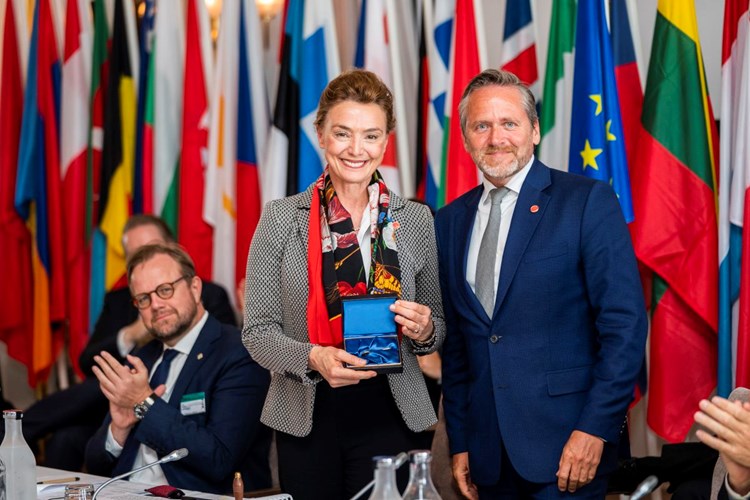- Published: 18.05.2018.
Croatia takes over Council of Europe chairmanship
Croatia on Friday took over the chairmanship of the Council of Europe, which will be an opportunity for the country to brand itself politically and culturally and prepare for the presidency of the European Union in the first half of 2020.
Croatia's Minister of Foreign and European Affairs, Marija Pejcinovic Buric, took over the rotating chairmanship from her Danish counterpart Anders Samuelsen at a ceremony in Helsingor.
She said that Croatia's priorities would be the fight against corruption, protection of ethnic minorities and vulnerable groups, decentralisation in the context of strengthening local government, and conservation of cultural heritage and culture routes.
Croatia joined this pan-European organisation in 1996 and is presiding over it for the first time.
"In these six months, considering the number of activities, Croatia will be more prominent on the international scene and will brand itself politically and culturally. This presidency is in a way a preparation for the major presidency in 2020, which will be much more comprehensive given that that year Croatia will have to organise 1,400 meetings," Pejcinovic Buric told the press. "This will be a useful school for our future presidency," she added.
In light of a report earlier this week in which the Council of Europe's European Commission against Racism and Intolerance criticised Croatia for hate speech targeting ethnic Serbs, LGTB persons and Roma and for growing nationalism, reporters asked the minister how these criticisms reflected on her second priority, which is protecting ethnic minorities and vulnerable groups.
"The Council of Europe Committee of Ministers does not discuss such reports. Those reports are compiled for each member state of the Council every five years. The previous report for Croatia was done in 2012. This report in some of its sections commends Croatia, but it also addresses some aspects where no progress or a step back was made," Pejcinovic Buric said.
She said that these issues would be addressed at the national level and would also be raised at some of the Council meetings.
Commenting on the report, Council of Europe Secretary General Thorbjorn Jagland said that the Croatian authorities, as well as parliament, political parties and civil society, should read the report carefully and see what conclusions could be drawn from it. He stressed the importance of implementing existing laws.
Danish Foreign Minister Anders Samuelsen wished Croatia success in these challenging times for the organisation. He said that Denmark had worked on the reform of the human rights protection system and focused on the role and powers of the European Court of Human Rights, the promotion of rights for LGBT persons, education about democratic values, the rights of persons with disabilities and the fight against torture.
Pejcinovic Buric spoke in great detail about Croatia's priorities, and when asked why Croatia chose those priorities given that it did not stand very well on some of them, she said: "We chose these priorities ourselves and in consultation with the Council of Europe. Human rights are the foundations around which the priorities must revolve. The issue of corruption shows that no country or institution is immune and that work on the standards and their implementation should continue."
Asked if the Council of Europe was losing its importance given the number of existing organisations and the fact that the focus was on the European Union, Pejcinovic Buric said it was true that there were organisations whose activities partly overlapped, which contributed to their inefficiency, but stressed that this was not the case with the Council of Europe and the EU.
Croatia will hand over its chairmanship to Finland at a ceremony in Strasbourg on November 21, and the next meeting of the Committee of Ministers will take place in Helsinki on May 16 and 17, 2019, the year when the Council of Europe marks 70 years of its foundation.
The Council of Europe has 47 members, all European countries with the exception of Belarus, and is the oldest European organisation. It was established in London on May 5, 1949 with the aim of promoting European unity and upholding democracy, human rights and rule of law in Europe.
Text: Hina
Photo: EPA
